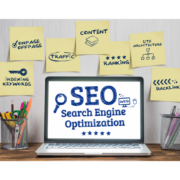Content creation is an essential part of any website’s success. Website content is what drives users to the site, keeps them engaged and leads them to take action. It’s important for website owners to understand the value of creating high-quality content that resonates with their target audience. In this blog post, we’ll look at why content creation is so important for website success and how to get started.
What is content creation?
Content creation refers to the process of developing and publishing content on various digital platforms. In simpler terms, it is the art of producing written, visual or audio material for websites. Content creation encompasses the creation of a wide range of materials, such as blog posts, articles, videos, infographics, podcasts, images and social media posts, among others. This is an important aspect of digital marketing because it allows website owners to connect with their audience, engage with them and ultimately drive conversions. Good content creation can lead to increased brand awareness, increased engagement with customers and an overall better online presence.
Many different types of content can be created for websites, depending on the website owner’s goals and objectives. For example, blog posts are a popular form of content creation for websites. Blogging is an effective way to attract traffic to your website, as well as build relationships with your audience. Other types of content that can be created for websites include ebooks, webinars, white papers, case studies and how-to guides.
When it comes to effective content creation, there are a few tips to keep in mind.
First, it’s important to know your target audience. Understanding their needs, wants and pain points can help you create content that resonates with them.
Second, focus on creating content that is valuable and informative, rather than promotional. People don’t like feeling like they’re being sold to, so aim to educate and entertain your audience instead.
Third, use a consistent tone and style throughout your content to maintain a strong brand identity.
Consistency is key when it comes to content creation. Regularly publishing fresh, high-quality content can help improve your website’s search engine rankings, drive traffic and increase engagement with your audience. It’s important to develop a content creation schedule that works for your business, whether that’s publishing new blog posts once a week or creating a new video every month.
Fortunately, there are plenty of tools and resources available to help you with your content creation efforts. From content management systems like WordPress to content creation tools like Canva, there are many tools that can help simplify the content creation process. And when it comes to measuring the success of your content creation efforts, there are a variety of analytics tools that can help you track website traffic, engagement and conversions. By analyzing this data, you can determine which types of content are resonating with your audience and adjust your content creation strategy accordingly.







